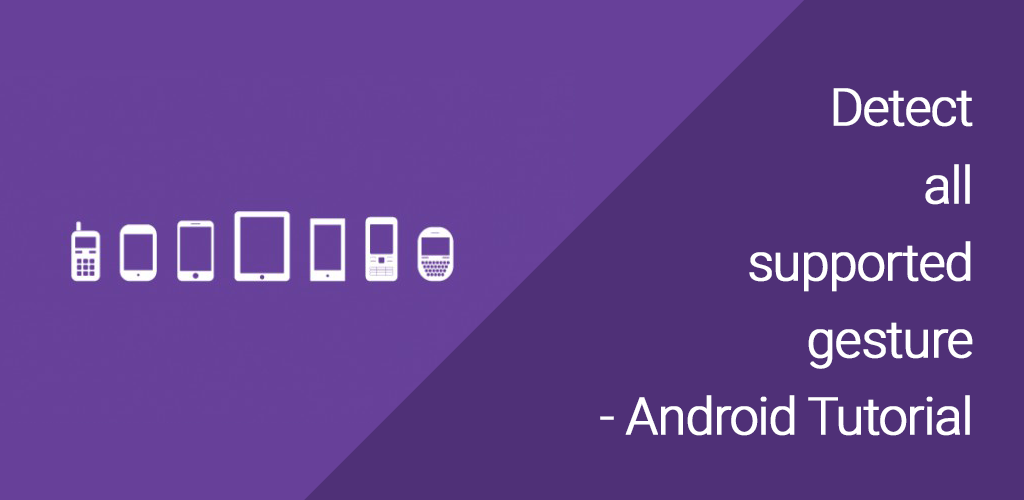Android detecting all supported Gestures
The term “gesture” is used to define a contiguous sequence of interactions between the touch screen and the user. A typical gesture begins at the point that the screen is first touched and ends when the last finger or pointing device leaves the display surface. Gestures can be implemented as a form of communication between user and application. Swiping motions to turn the pages of an eBook , or a pinching movement involving two touches to zoom in or out of an image are prime examples of the ways in which gestures can be used to interact with an application. Some common gestures that android supports are pinch , double tap, scrolls , long presses and fling .
Android provides GestureDetector class to receive motion events and tell us that these events correspond to gestures or not. To use it , you need to create an object of GestureDetector and then extend another class with GestureDetector.SimpleOnGestureListener to act as a listener and override some methods .
public class MainActivity extends Activity implements
GestureDetector.OnGestureListener,
GestureDetector.OnDoubleTapListener{
private static final String DEBUG_TAG = "Gestures";
private GestureDetectorCompat mDetector;
// Called when the activity is first created.
@Override
public void onCreate(Bundle savedInstanceState) {
super.onCreate(savedInstanceState);
setContentView(R.layout.activity_main);
// Instantiate the gesture detector with the
// application context and an implementation of
// GestureDetector.OnGestureListener
mDetector = new GestureDetectorCompat(this,this);
// Set the gesture detector as the double tap
// listener.
mDetector.setOnDoubleTapListener(this);
// you can set other gesture listeners over here
}
@Override
public boolean onTouchEvent(MotionEvent event){
this.mDetector.onTouchEvent(event);
// Be sure to call the superclass implementation
return super.onTouchEvent(event);
}
@Override
public boolean onDown(MotionEvent event) {
Log.d(DEBUG_TAG,"onDown: " + event.toString());
return true;
}
@Override
public boolean onFling(MotionEvent event1, MotionEvent event2,
float velocityX, float velocityY) {
Log.d(DEBUG_TAG, "onFling: " + event1.toString()+event2.toString());
return true;
}
@Override
public void onLongPress(MotionEvent event) {
Log.d(DEBUG_TAG, "onLongPress: " + event.toString());
}
@Override
public boolean onScroll(MotionEvent e1, MotionEvent e2, float distanceX,
float distanceY) {
Log.d(DEBUG_TAG, "onScroll: " + e1.toString()+e2.toString());
return true;
}
@Override
public void onShowPress(MotionEvent event) {
Log.d(DEBUG_TAG, "onShowPress: " + event.toString());
}
@Override
public boolean onSingleTapUp(MotionEvent event) {
Log.d(DEBUG_TAG, "onSingleTapUp: " + event.toString());
return true;
}
@Override
public boolean onDoubleTap(MotionEvent event) {
Log.d(DEBUG_TAG, "onDoubleTap: " + event.toString());
return true;
}
@Override
public boolean onDoubleTapEvent(MotionEvent event) {
Log.d(DEBUG_TAG, "onDoubleTapEvent: " + event.toString());
return true;
}
@Override
public boolean onSingleTapConfirmed(MotionEvent event) {
Log.d(DEBUG_TAG, "onSingleTapConfirmed: " + event.toString());
return true;
}
}
Enjoy Coding and Share Knowledge
